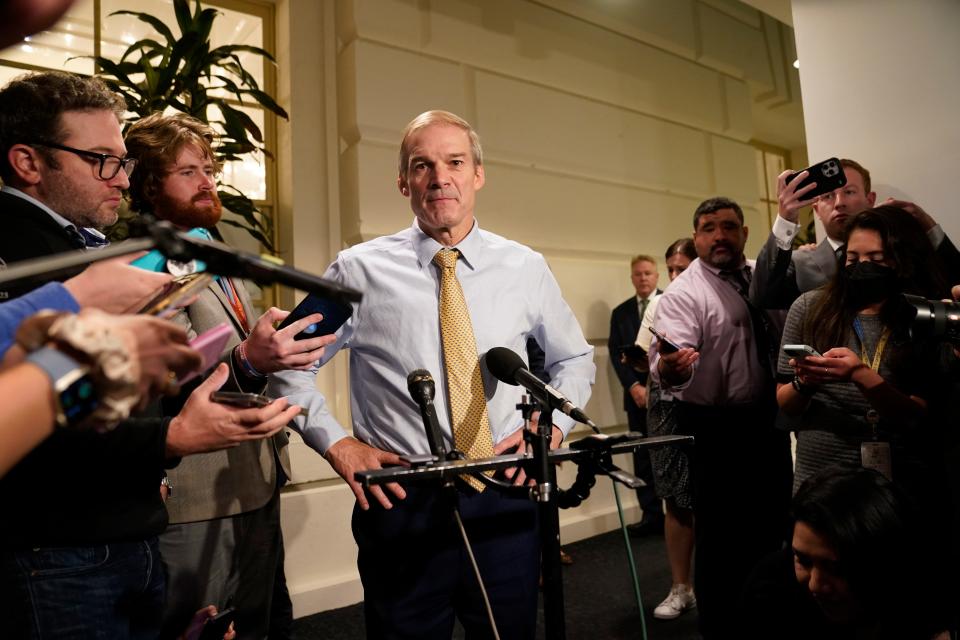Cut it out, Americans by more than 2-1 tell the House: Elect a speaker, already
The soap opera that has consumed members of Congress for nearly three weeks over electing a new speaker is testing the patience of the voters who sent them to Washington, a new USA TODAY/Suffolk University Poll finds.
An overwhelming 67% say the House should elect a speaker as soon as possible, as decisions loom on wartime aid for Israel and Ukraine and legislation to prevent a government shutdown next month.
"We got to have a speaker, (but) I don't think we're going to have anybody soon," said George Ramge, 72, of San Diego, a building contractor and political independent. "There's a lot of Hollywood politicians out there getting their time on TV, and I don't think they're really serving the people's purpose."
"They need to be functioning, and that's the only way they're going to function," said Carl Hickey, 85, of Monkton, Maryland, a retired Methodist minister and a Democrat, said in a follow-up interview after being called in the poll.
A quarter of those surveyed say they don't care whether a speaker is elected, on the theory that the impasse is preventing Congress from wasting more taxpayer money.
"It's not like they do anything anyways," said Dustin Gibbons, 34, a home warranty manager from Queen Creek, Arizona, and a Republican. "I don't think that a speaker in the House is going to do anything other than, you know, just keep kicking that ball along."
The poll of 1,000 registered voters, taken by landline and cellphone Tuesday through Friday, has a margin of error of plus or minus 3.1 percentage points.

In a political world where bipartisanship is the exception, there is a broad consensus on this. By double-digit margins, the idea of electing a speaker, and fast, was endorsed not only among Democrats (86%-10%) but also Republicans (57%-34%) and independents (59%-32%).
"How often do you see Democrats, Republicans, and independents agree on anything in D.C.?" said David Paleologos, director of Suffolk's Political Research Center. "Look at every demographic: gender, geography, age, race, education level, income, political philosophy, even those who trust CNN vs Fox News. They are all speaking the same seven words in unison: 'Elect a speaker and do your job.'"
The previous House speaker, Rep. Kevin McCarthy, R-Calif., was ousted from the post by a handful of combative conservatives, just eight of them but enough, with the votes of House Democrats, given the GOP's narrow majority. Since then, no potential successor has been able to command the 217 votes needed. Ohio congressman Jim Jordan was defeated three times before the Republican caucus voted Friday to sideline him.
House Republicans are scheduled to meet late Monday to figure out what to do next.
Who's in charge here?
The scenes of Capitol chaos displayed on cable TV last week may be eroding voters' confidence in the ability of the nation's leaders in the White House and Congress to address the nation's major challenges.
Just 4% of those surveyed express "a lot" of confidence in leaders; an additional 32% had "some" confidence. But the largest group, 35%, have "very little" confidence and an additional 27% had none at all.
"If I could go negative five, I would give it a negative 100," Gibbons said.
Democrats, who traditionally have supported a bigger role for government, have more confidence in its ability to solve problems; 63% had "a lot" or "some" confidence.
But Republicans, whose leaders in recent years have portrayed the government as either incompetent or dangerous, were overwhelmingly skeptical that Washington could be trusted to do anything right. A plurality of Republicans, 42%, said they had no confidence in government; an additional 38% had "very little."
Ratings for the Senate are nothing to brag about, with 36% having a favorable view, and 42% an unfavorable one.
But ratings for the House are even worse. Just 25% see it favorably; more than double that, 54%, view it unfavorably.
When there is a speaker, the partisan conundrum ahead
Once there is a speaker, most voters have a suggestion of what they want them to do next: A compromise that avoids a government shutdown when the latest temporary funding bill expires Nov. 17.
More than 6 in 10, 61%, want negotiations to reach a deal. "I mean, don't we live in a bipartisan world?" said Desiree Whitney, 64, of Boerne, Texas, an independent who voted for former President Donald Trump in 2020. "Why should it stop, you know at our government, or does it begin there? I mean, it's all about negotiations."
But there's a catch. While just 31% want their representatives to stand firm on demands to cut spending, even if it means a government shutdown, that group includes a 55% majority of Republicans. Only 37% in the GOP endorse a negotiated compromise.
And Republicans control what happens in the House − assuming, of course, they succeed in electing a speaker.
This article originally appeared on USA TODAY: Cut it out, Americans by 2-1 tell the House. Elect a speaker, already

